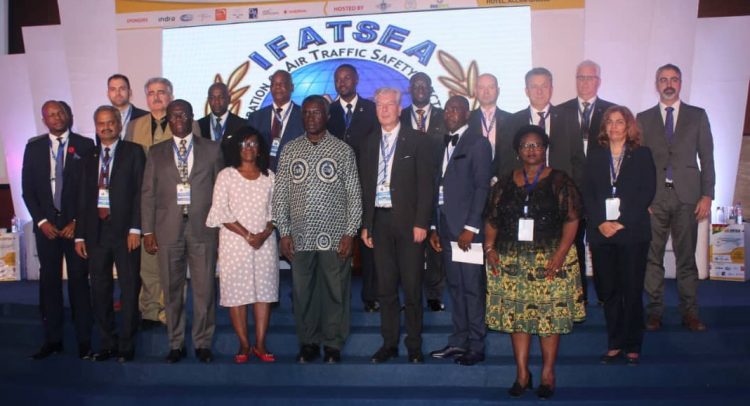Prof Frimpong Boateng (middle) with officials of IFATSEA in photo after the opening ceremony
VICE PRESIDENT Dr. Mahamudu Bawumia has stated that Government is working hard to revive the country’s airline industry to engender socio-economic and cultural development.
Dr. Bawumia said there were measures in place to position Ghana to gain from the opportunities the global aviation industry offered.
A speech read on his behalf at the opening of the 49th International Federation of Air Traffic Safety Electronics Association (IFATSEA) in Accra recently, he said, “The forecasted exponential increase in air traffic volumes is good piece of news, but growth also presents safety risks that must be properly addressed, not just by appropriate regulatory framework but also through availability of skilled human resources including Air Traffic Safety Electronics Personnel (ATSEP).”
It was themed, “ATSEP contribution to global aviation: Assuring safety, delivering ATM/CNS critical infrastructure performance.”
Dr. Bawumia said a new Air Navigation Service (ANS) complex which comprises Air Traffic Management (ATM) equipment and control tower was currently under construction to enhance communications and navigation.
“We have also begun the construction of an ultra-modern head office for Ghana Civil Aviation Authority and the construction of new passenger Terminal Building for the Kumasi International Airport and the Tamale International Airport and the Sunyani Airport,” he added.
The vice president said the implementation of the Ministry of Aviation’s initiative, ‘Aviation-Driven Developments’ would realize the construction of Ghana’s first maintenance, overhaul and repair (MRO) facility at the Tamale International Airport, construction of cargo facility and development of world-class pilot training organization.
Simon Allotey, Director General of the Ghana Civil Aviation Authority, in a speech said 17 people had successfully gone through training at the GCAA training academy with several others pursuing similar training at advanced stage.
Frank Kofi Apeagyei, IFATSEA Region African Director, urged participants to take the opportunity to deliberate on key issues that inevitably would impact the work of ATSEP in the future including technology and cyber attacks.
By Jamila Akweley Okertchiri

